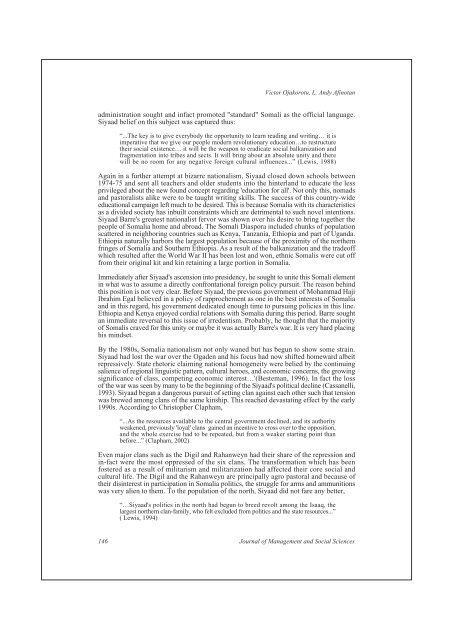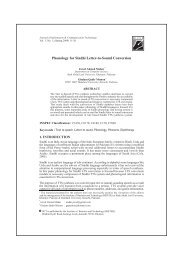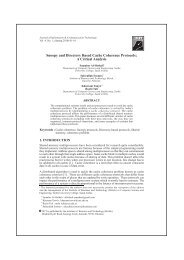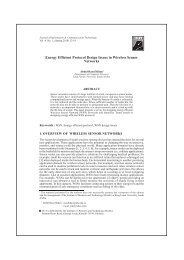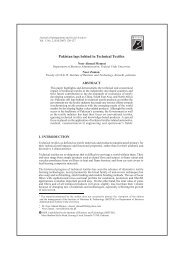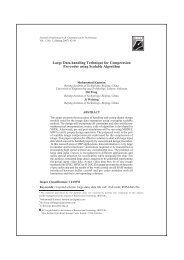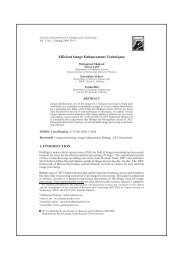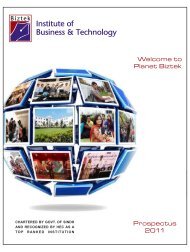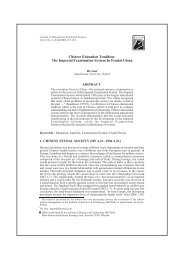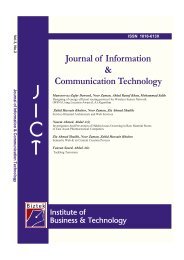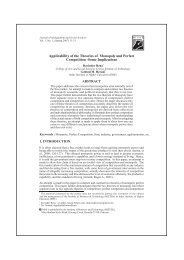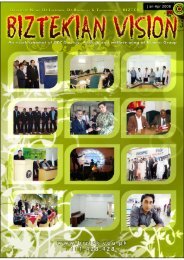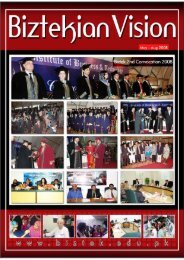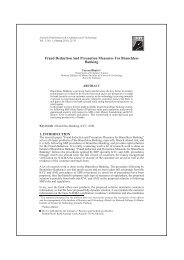State Reconstitution and the Challenge of Democracy in Somalia
State Reconstitution and the Challenge of Democracy in Somalia
State Reconstitution and the Challenge of Democracy in Somalia
You also want an ePaper? Increase the reach of your titles
YUMPU automatically turns print PDFs into web optimized ePapers that Google loves.
Victor Ojakorotu, L. Andy Af<strong>in</strong>otan<br />
adm<strong>in</strong>istration sought <strong>and</strong> <strong>in</strong>fact promoted "st<strong>and</strong>ard" Somali as <strong>the</strong> <strong>of</strong>ficial language.<br />
Siyaad belief on this subject was captured thus:<br />
“...The key is to give everybody <strong>the</strong> opportunity to learn read<strong>in</strong>g <strong>and</strong> writ<strong>in</strong>g… it is<br />
imperative that we give our people modern revolutionary education…to restructure<br />
<strong>the</strong>ir social existence… it will be <strong>the</strong> weapon to eradicate social balkanization <strong>and</strong><br />
fragmentation <strong>in</strong>to tribes <strong>and</strong> sects. It will br<strong>in</strong>g about an absolute unity <strong>and</strong> <strong>the</strong>re<br />
will be no room for any negative foreign cultural <strong>in</strong>fluences...” (Lewis, 1988)<br />
Aga<strong>in</strong> <strong>in</strong> a fur<strong>the</strong>r attempt at bizarre nationalism, Siyaad closed down schools between<br />
1974-75 <strong>and</strong> sent all teachers <strong>and</strong> older students <strong>in</strong>to <strong>the</strong> h<strong>in</strong>terl<strong>and</strong> to educate <strong>the</strong> less<br />
privileged about <strong>the</strong> new found concept regard<strong>in</strong>g 'education for all'. Not only this, nomads<br />
<strong>and</strong> pastoralists alike were to be taught writ<strong>in</strong>g skills. The success <strong>of</strong> this country-wide<br />
educational campaign left much to be desired. This is because <strong>Somalia</strong> with its characteristics<br />
as a divided society has <strong>in</strong>built constra<strong>in</strong>ts which are detrimental to such novel <strong>in</strong>tentions.<br />
Siyaad Barre's greatest nationalist fervor was shown over his desire to br<strong>in</strong>g toge<strong>the</strong>r <strong>the</strong><br />
people <strong>of</strong> <strong>Somalia</strong> home <strong>and</strong> abroad. The Somali Diaspora <strong>in</strong>cluded chunks <strong>of</strong> population<br />
scattered <strong>in</strong> neighbor<strong>in</strong>g countries such as Kenya, Tanzania, Ethiopia <strong>and</strong> part <strong>of</strong> Ug<strong>and</strong>a.<br />
Ethiopia naturally harbors <strong>the</strong> largest population because <strong>of</strong> <strong>the</strong> proximity <strong>of</strong> <strong>the</strong> nor<strong>the</strong>rn<br />
fr<strong>in</strong>ges <strong>of</strong> <strong>Somalia</strong> <strong>and</strong> Sou<strong>the</strong>rn Ethiopia. As a result <strong>of</strong> <strong>the</strong> balkanization <strong>and</strong> <strong>the</strong> trade<strong>of</strong>f<br />
which resulted after <strong>the</strong> World War II has been lost <strong>and</strong> won, ethnic Somalis were cut <strong>of</strong>f<br />
from <strong>the</strong>ir orig<strong>in</strong>al kit <strong>and</strong> k<strong>in</strong> reta<strong>in</strong><strong>in</strong>g a large portion <strong>in</strong> <strong>Somalia</strong>.<br />
Immediately after Siyaad's ascension <strong>in</strong>to presidency, he sought to unite this Somali element<br />
<strong>in</strong> what was to assume a directly confrontational foreign policy pursuit. The reason beh<strong>in</strong>d<br />
this position is not very clear. Before Siyaad, <strong>the</strong> previous government <strong>of</strong> Mohammad Haji<br />
Ibrahim Egal believed <strong>in</strong> a policy <strong>of</strong> rapprochement as one <strong>in</strong> <strong>the</strong> best <strong>in</strong>terests <strong>of</strong> <strong>Somalia</strong><br />
<strong>and</strong> <strong>in</strong> this regard, his government dedicated enough time to pursu<strong>in</strong>g policies <strong>in</strong> this l<strong>in</strong>e.<br />
Ethiopia <strong>and</strong> Kenya enjoyed cordial relations with <strong>Somalia</strong> dur<strong>in</strong>g this period. Barre sought<br />
an immediate reversal to this issue <strong>of</strong> irredentism. Probably, he thought that <strong>the</strong> majority<br />
<strong>of</strong> Somalis craved for this unity or maybe it was actually Barre's war. It is very hard plac<strong>in</strong>g<br />
his m<strong>in</strong>dset.<br />
By <strong>the</strong> 1980s, <strong>Somalia</strong> nationalism not only waned but has begun to show some stra<strong>in</strong>.<br />
Siyaad had lost <strong>the</strong> war over <strong>the</strong> Ogaden <strong>and</strong> his focus had now shifted homeward albeit<br />
repressively. <strong>State</strong> rhetoric claim<strong>in</strong>g national homogeneity were belied by <strong>the</strong> cont<strong>in</strong>u<strong>in</strong>g<br />
salience <strong>of</strong> regional l<strong>in</strong>guistic pattern, cultural heroes, <strong>and</strong> economic concerns, <strong>the</strong> grow<strong>in</strong>g<br />
significance <strong>of</strong> class, compet<strong>in</strong>g economic <strong>in</strong>terest…'(Besteman, 1996). In fact <strong>the</strong> loss<br />
<strong>of</strong> <strong>the</strong> war was seen by many to be <strong>the</strong> beg<strong>in</strong>n<strong>in</strong>g <strong>of</strong> <strong>the</strong> Siyaad's political decl<strong>in</strong>e (Cassanelli,<br />
1993). Siyaad began a dangerous pursuit <strong>of</strong> sett<strong>in</strong>g clan aga<strong>in</strong>st each o<strong>the</strong>r such that tension<br />
was brewed among clans <strong>of</strong> <strong>the</strong> same k<strong>in</strong>ship. This reached devastat<strong>in</strong>g effect by <strong>the</strong> early<br />
1990s. Accord<strong>in</strong>g to Christopher Clapham,<br />
“...As <strong>the</strong> resources available to <strong>the</strong> central government decl<strong>in</strong>ed, <strong>and</strong> its authority<br />
weakened, previously 'loyal' clans ga<strong>in</strong>ed an <strong>in</strong>centive to cross over to <strong>the</strong> opposition,<br />
<strong>and</strong> <strong>the</strong> whole exercise had to be repeated, but from a weaker start<strong>in</strong>g po<strong>in</strong>t than<br />
before...” (Clapham, 2002)<br />
Even major clans such as <strong>the</strong> Digil <strong>and</strong> Rahanweyn had <strong>the</strong>ir share <strong>of</strong> <strong>the</strong> repression <strong>and</strong><br />
<strong>in</strong>-fact were <strong>the</strong> most oppressed <strong>of</strong> <strong>the</strong> six clans. The transformation which has been<br />
fostered as a result <strong>of</strong> militarism <strong>and</strong> militarization had affected <strong>the</strong>ir core social <strong>and</strong><br />
cultural life. The Digil <strong>and</strong> <strong>the</strong> Rahanweyn are pr<strong>in</strong>cipally agro pastoral <strong>and</strong> because <strong>of</strong><br />
<strong>the</strong>ir dis<strong>in</strong>terest <strong>in</strong> participation <strong>in</strong> <strong>Somalia</strong> politics, <strong>the</strong> struggle for arms <strong>and</strong> ammunitions<br />
was very alien to <strong>the</strong>m. To <strong>the</strong> population <strong>of</strong> <strong>the</strong> north, Siyaad did not fare any better,<br />
“…Siyaad's politics <strong>in</strong> <strong>the</strong> north had begun to breed revolt among <strong>the</strong> Isaaq, <strong>the</strong><br />
largest nor<strong>the</strong>rn clan-family, who felt excluded from politics <strong>and</strong> <strong>the</strong> state resources...”<br />
( Lewis, 1994)<br />
146 Journal <strong>of</strong> Management <strong>and</strong> Social Sciences


